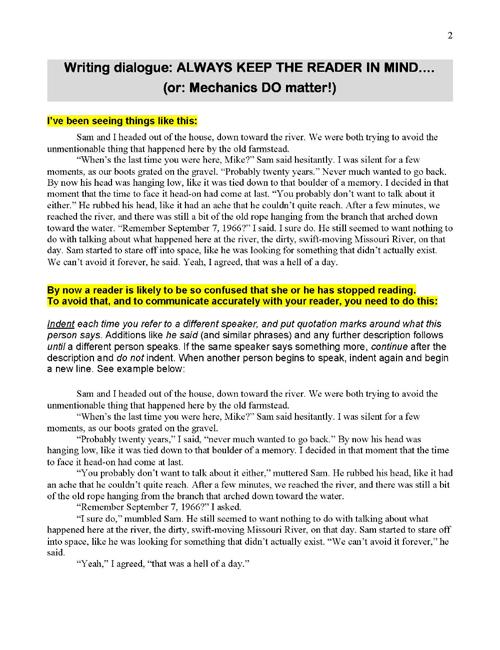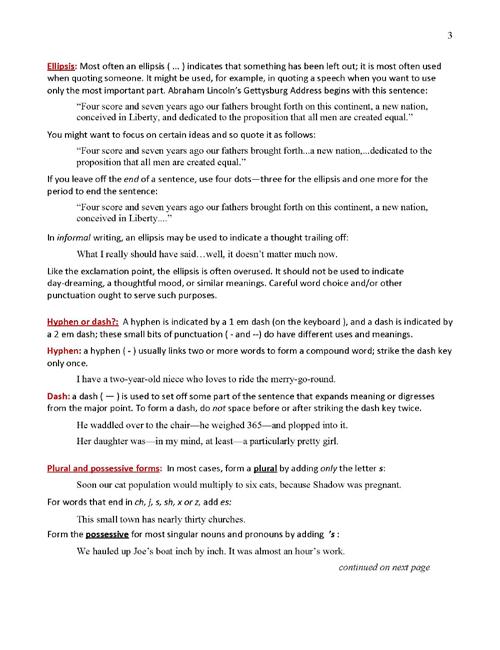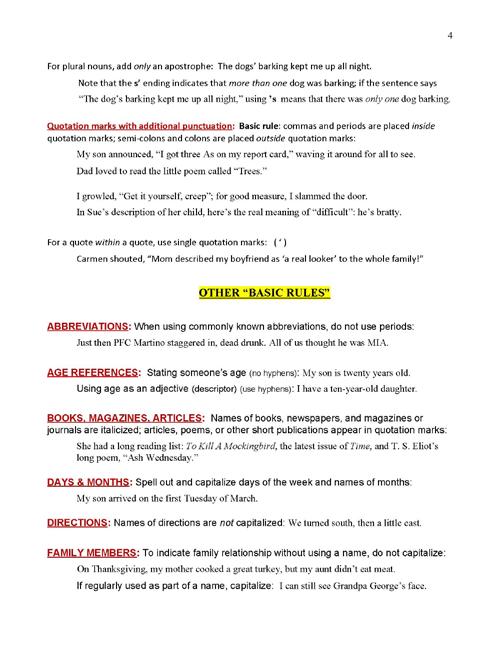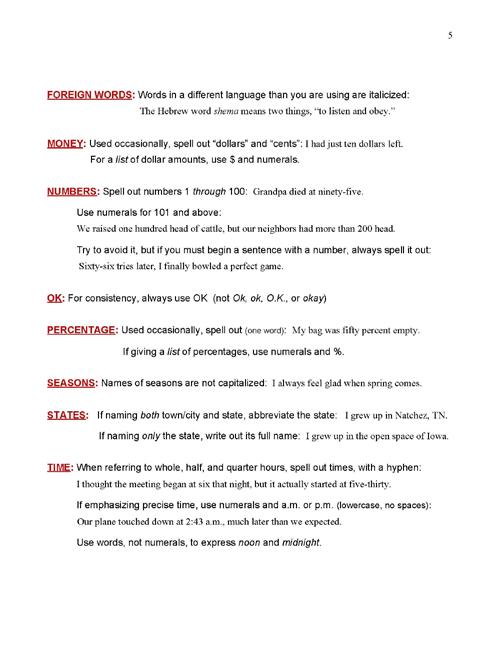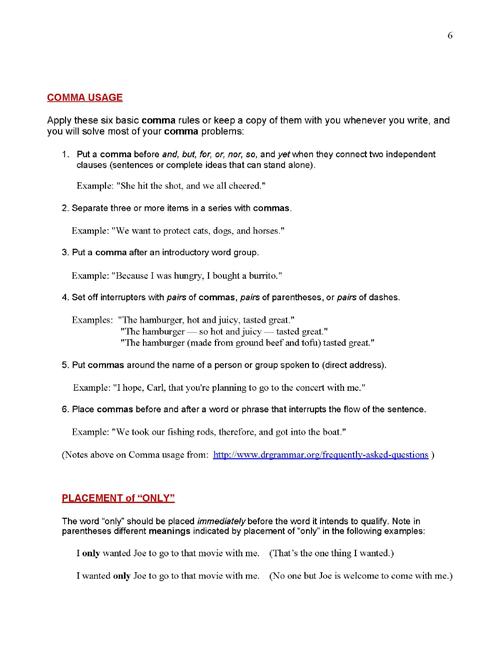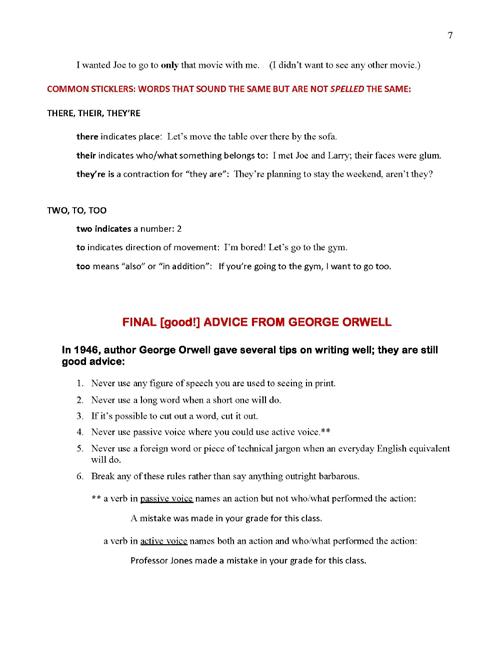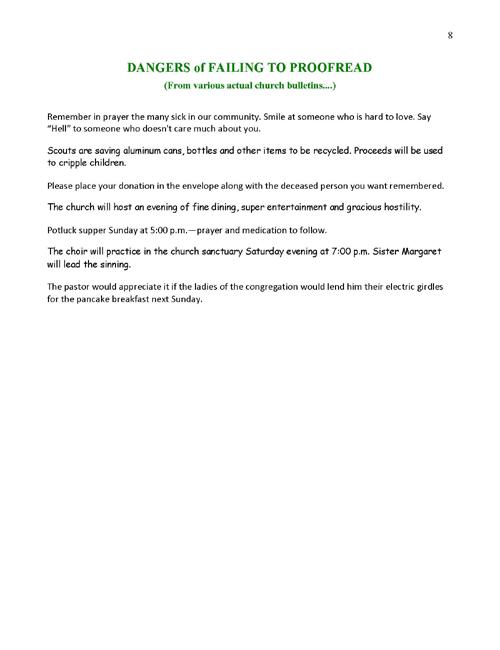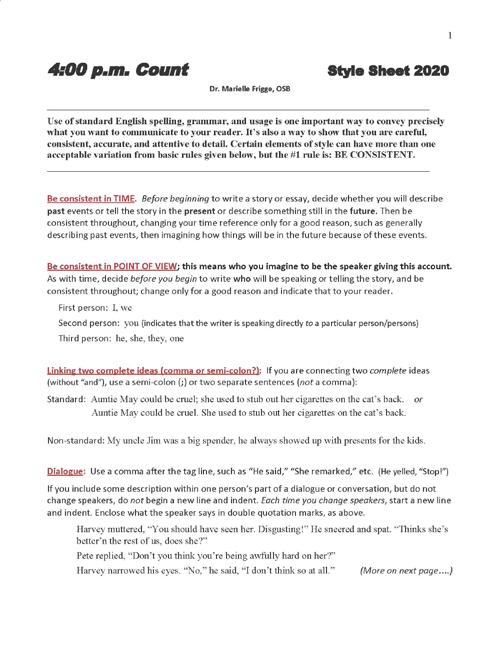
4 minute read
FPC Yankton Style Sheet
from 2020 4 P.M. Count
by 4 P.M. Count
As noted in the editor’s Foreword, this year’s edition of 4 P.M. Count includes the Style Sheet for the Creative Writing class in use for the last decade here at Federal Prison Camp Yankton. I have been copy editing this journal since its inception, and after a year or two began to believe that many of the men in the Creative Writing class could benefit from having written guidance on use of Standard English at hand. As anyone might imagine, many of these students have little or ineffective educational backgrounds. On the other hand, as I often emphasize, upon their release, these men will be job hunting, which will require writing applications, cover letters, and the like. Besides this practical reason, ability to use written Standard English can help students to communicate clearly and effectively in their creative writing efforts at present.
The Style Sheet is certainly not exhaustive. I was guided by what I was reading, that is, I included elements of style that were most often misused or that caused confusion for some students. Throughout the class and in the Style Sheet, I emphasize two things necessary for both good writing and for daily life: an ability to communicate clearly, and consistency. In some cases, more than one rendering might be considered acceptable Standard English; in such instances, I designated one usage for the sake of consistency. Because more prisons at various levels across the country have begun or are considering writing classes, the FPC Yankton Style Sheet appears in this issue of 4 P.M. Count as a possible aid for such endeavors. In addition, it might help current students who are still in lockdown due to Covid-19 and unable to conduct in-person classes.
Advertisement
FIRST NOTES FOR CREATIVE WRITING CLASS
1. In the beginning of this class Dr. Reese tells you not to worry about spelling and punctuation and grammar and so on, but just WRITE. This is an important beginning, helping you to find your voice.
2. HOWEVER—it’s not the end of the process of good writing—not by a long shot.
3. After you find your voice, and after you discover that you have something to say and can say it, you need to become more concerned about communicating well with your reader.
A. Communication is always about two parties: • the one communicating (in this case, you, through your writing) • and the one/s you want to communicate something
TO—your chosen “audience.”
Audience awareness is an extremely important part of good writing that is too often ignored!
B. Designate your audience: • other members of the class? • your teacher/s? • visiting writers? • your family? • the general public? (In general, assume this is your audience) • people who don’t think prisoners should be
‘coddled’ by having classes offered?
• C. Analyze your audience:
what do they already know about what you want to say? what do they not know? how do they feel about what you what to communicate? if you want to convince someone of something, what are their likely points of agreement at this point? What are their likely points of disagreement? How can each point be addressed effectively?
D. Certain choices need to be made carefully before you begin a serious draft:
1) Time frame: past? present? future? Once you decide, be consistent; shift only for a good reason—a reason that you make very clear to your audience.
2) Point of view: • I/we: the writer is the actor/speaker, “I”, or one of a group, “we” • You: the writer is directly addressing someone/s (used least often) • He/She/They: Someone other than the writer is performing the action
Again, make a decision, then be consistent or you will confuse your reader, damaging or destroying good communication with your chosen audience.
4. A good writing exercise might be to write a narrative in first person, then in third person, and assess which might be most effective for your chosen audience. Try the same with time frame. Try communicating what you have to say in prose and in poetry—which communicates what you want to say most effectively for your chosen audience?
5. These requirements for effective written communication are also of value to you as a person:
A. Thinking through your choices and actions beforehand.
B. The discipline of consistency (both words here are important!)
C. Attention to and respect for the “other”—in your life experience, you might have been spared from some poor decisions if you had thought about others in your life, and how what you were doing or not doing might affect other people.
D. Learning that “little things” can be extremely important.
E. Experience in good communication.
FPC YANKTON STYLE SHEET
